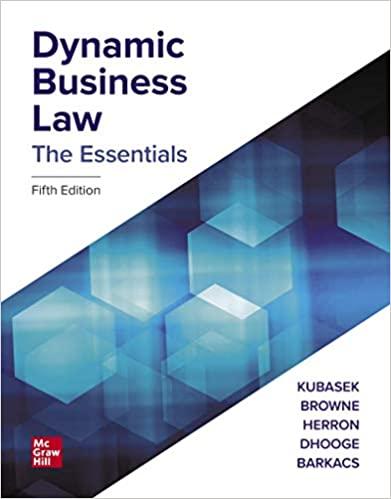T. Christian Cooper was a partner to Sanders and Richard Campbell d/b/a The Mullen Company. In 2001,
Question:
T. Christian Cooper was a partner to Sanders and Richard Campbell d/b/a The Mullen Company. In 2001, Cooper helped bring about a management agreement between The Mullen Co. and Newnan Crossing Partnership. Newnan was a partnership of several families in Mexico and was represented by Roberto Segovia. Under the agreement, the Mullen Co. was responsible for developing and managing ten real estate locations. In 2006, Cooper learned that a third-party company was interested in making investments in the real estate properties related to the agreement between Newnan and the Mullen Co. Cooper took it upon himself in his individual capacity to negotiate a $600,000 loan from Segovia and become a partner in the third-party venture. Cooper agreed to apply all distributions from the partnership to the note. While he did receive distributions totaling over $1.4 million, he did not apply any of it to the note. In 2010, Segovia died and the new management at Newnan refused to pay the Mullen Co. $1.8 million in management fees that the Mullen Co. believed it was owed pursuant to the management agreement. The Mullen Co. sued Newnan and eventually reached a settlement in 2012. The settlement stipulated that the Mullen Co. would dismiss its lawsuit in exchange for $300,000 and an assignment of any causes of actions Newnan had against Cooper or the Mullen Co. As required in the agreement, Newnan assigned the $600,000 note to the Mullen Co. The Mullen Co. subsequently asserted a claim on the $600,000 promissory note against Cooper. Cooper responded by asserting that Mullen Co. had breached its fiduciary duty to Cooper as a partner and for breach of contract. The jury found in favor of both the Mullen Co. and Cooper on several counts and the final judgment awarded $1,431,000 in damages to the Mullen Co. and $519,300 to Cooper. Both parties appealed. In the appeal, Cooper argued, inter alia, that he could not be held personally liable according to the terms of the promissory note because the promissory note was also a non-recourse note. The nonrecourse provision is as follows: “Nothing in the Note or the Loan Documents to the contrary withstanding, Payee shall look solely to the Partnership Distributions (reduced by tax obligations of [Cooper], as provided above) and the Partnership Interest for payment on this Note. No deficiency judgment for amounts unsatisfied after application of such distributions and proceeds from sale of the Partnership Interest shall ever be instituted, sought, taken or obtained against any party for any amounts which become due and owing.” Did the nonrecourse provision shield Cooper from having to pay beyond the agreed-upon collateral? How do you think a non-recourse provision coexists with the unconditional promise to pay required by negotiable instruments?
Step by Step Answer:

Dynamic Business Law The Essentials
ISBN: 9781260253382
5th Edition
Authors: Nancy Kubasek, M. Neil Browne, Daniel Herron, Lucien Dhooge, Linda Barkacs





